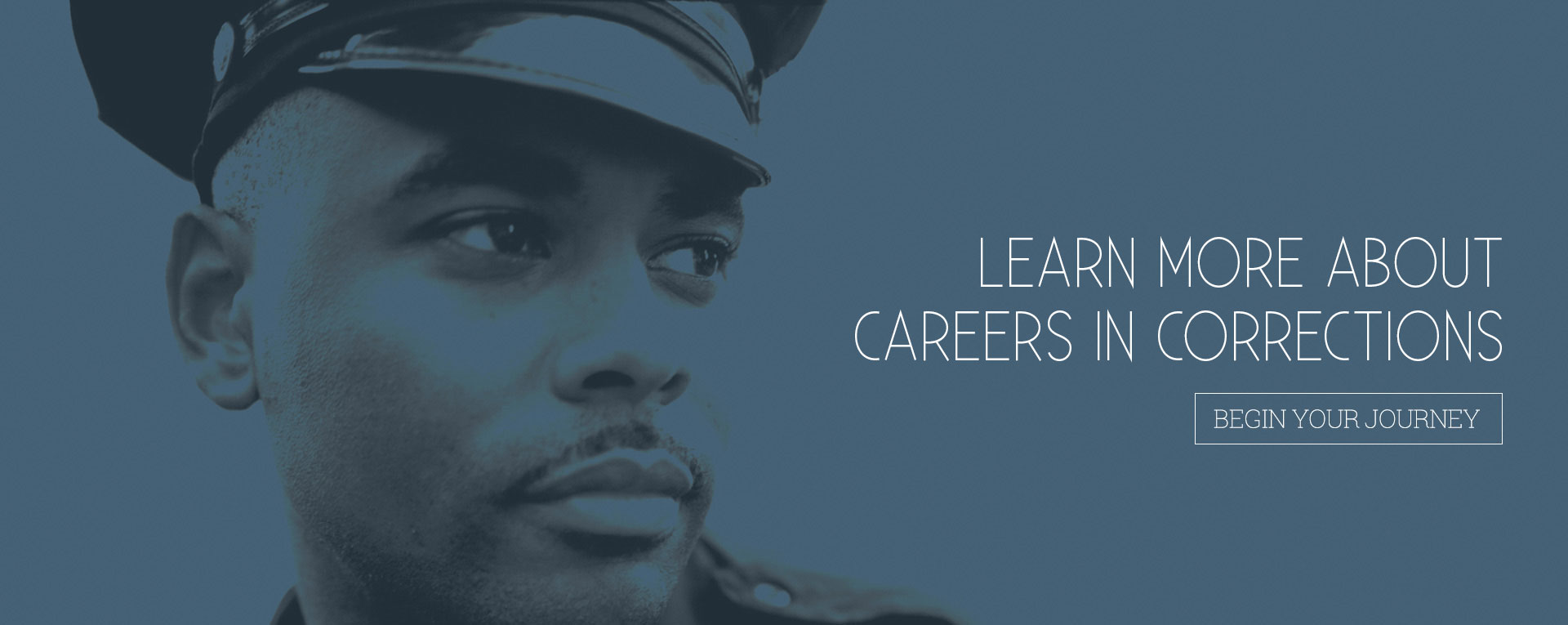
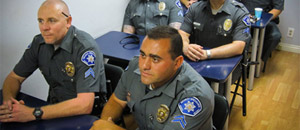
Correctional Careers
Serve the community and keep the public safe with one of the many careers in the field of Corrections.

Criminal Justice Degrees
A degree in criminal justice opens doors in a wide variety of fields. Explore programs that are best suited for your chosen career.
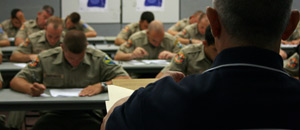
Correctional Officer Test
Prepare for the correctional officer exam and review helpful tips about the application process.
Correctional Agencies- Protecting Our Communities
It’s an unfortunate fact - the prison population in the United States is the largest in the world - by a wide margin. United States prisons alone, account for over 25% of the world's prison population.
Correctional Officers, who are the center piece of the correctional system, are responsible for protecting the public by ensuring that federal inmates serve their sentences, that correctional facilities are secure, and that inmates are able to successfully re-enter the community upon release. With the number of people under supervision- either as inmates or parolees- expected to remain near record levels across the country, the impact of correctional officers on the criminal justice system is immeasurably large.
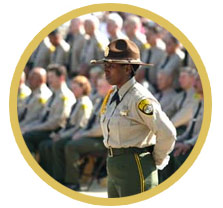
Finding Correctional Officer Degrees & Programs
Correctional departments and law enforcement agencies like to see candidates with some formal education and training. Programs catering to aspiring correctional officers combine principles of the criminal justice system, sociology, psychology and the legal system with practical training in techniques for crime detection and the handling of inmates. With potentially hundreds of programs available nationwide, we aim to help students find programs by offering in-depth school rankings for important criteria, such as popularity, affordability and return on investment. See rankings.
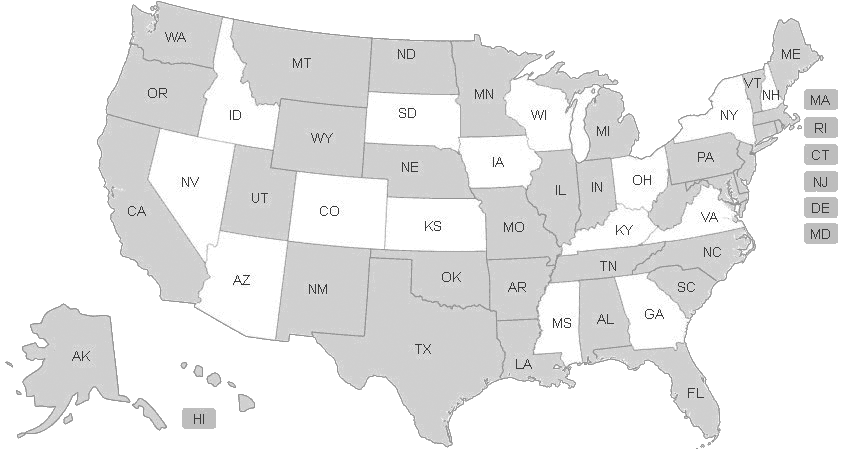

Careers in Corrections
Often the face of a correctional facility, the correctional officer is one of the most recognizable career choices for those who want to make a difference in the justice system or in the field of public safety. And while a large percentage of those employed by correctional departments are officers responsible for the custody of inmates, an equally large number come from professional backgrounds outside of criminal justice or law enforcement, including areas like health care, legal services, administration, social services, and engineering. Explore information about the wide array of careers available in both the community correctional arena and institutional correctional facilities:+Juvenile Corrections Officer
Additional Resources:
How to Become a Juvenile Corrections Officer
Office of Juvenile Justice and Delinquency Prevention
Council of Juvenile Correctional Administrators
The Annie E. Casey Foundation+Police Officer
Police officers are central figures within the law enforcement system, with responsibilities that routinely involve responding to emergency calls, monitoring criminal activity, investigating crimes, making arrests and taking part in community educational programs. Their jobs can be extremely challenging, yet incredibly rewarding.
In only a few jurisdictions, police officers are required to have an associate or bachelor’s degree in Criminal Justice, Criminology, Police Science, or related fields.
As of 2019, police officers earned an estimated mean salary of $67,600, with the top 10% earning more than $105,230.
(May 2019, U.S. Bureau of Labor Statistics salary estimates for police officers are based on national data, not school-specific information. Conditions in your area may vary. Data accessed November 2020.)
Additional Resources:
How to Become a Police Officer
Police and Detectives- Bureau of Labor Statistics
National Association of Police Organizations
Federal Law Enforcement Officers Association+Probation Officer
Probation officers, also known as correctional treatment specialists, are responsible for monitoring the conduct of non-incarcerated criminal offenders. The goal is to prevent the prior offender from committing new crimes by providing them resources such as rehabilitation programs and job training. Most employers require a bachelor’s degree in criminal justice, social work, behavioral science, or a related field. Some employers require a master’s degree.
Probation officers, also known as correctional treatment specialists, are responsible for monitoring the conduct of non-incarcerated criminal offenders. The goal is to prevent the prior offender from committing new crimes by providing them resources such as rehabilitation programs and job training. Most employers require a bachelor’s degree in criminal justice, social work, behavioral science, or a related field. Some employers require a master’s degree. As of 2019, the average annual salary for a probation officer was $59,910. The top 10% earned more than $94,860.
(May 2019, U.S. Bureau of Labor Statistics salary estimates for probation officers are based on national data, not school-specific information. Conditions in your area may vary. Data accessed November 2020.)
Additional Resources:
How to Become a Probation Officer
Probation Officer – Bureau of Labor Statistics
American Probation and Parole Association
Federal Probation and Pretrial Officers Association
+Crime Scene Investigator
A crime scene investigator, also referred to as a forensic science technician, is a law enforcement officer who is specially trained to analyze and document evidence at the scene of a crime. The educational requirements are set by the law enforcement department hiring the investigator. Some agencies will accept a two year degree; however, most require a bachelor’s or master’s degree. The degree should have an emphasis on scientific subjects and criminal justice. The estimated annual wage for a crime scene technician was $63,170 in May of 2019. The top 10% in field earned over $97,350.
(May 2019, U.S. Bureau of Labor Statistics salary estimates for crime scene investigators are based on national data, not school-specific information. Conditions in your area may vary. Data accessed November 2020.)
Additional Resources:
How to Become a Crime Scene Investigator
Detectives and Criminal Investigators- Bureau of Labor Statistics
The Association for Crime Scene Reconstruction
International Association of Crime Analysts+Game Warden
Game wardens, also known as fish and game wardens, patrol assigned areas to enforce the fish and game laws. They also investigate reports of damage to crops caused by wildlife. They compile biological data and submit reports which ultimately are used to set wildlife population management goals. The educational requirements are set by the governmental unit hiring the game warden, but preference is given to candidates who have prior law enforcement experience, military experience, or an associate’s or bachelor’s degree in criminal justice. In 2019, the estimated average salary was $57,690. The top 10% of game wardens earned more than $80,540.
(May 2019, U.S. Bureau of Labor Statistics salary estimates for game wardens are based on national data, not school-specific information. Conditions in your area may vary. Data accessed November 2020.)
Additional Resources:
How to Become a Game Warden
Game Warden – Bureau of Labor Statistics
North American Wildlife Enforcement Officers Association
Federal Wildlife Officers Association+State Trooper
A state trooper is a police officer employed at the state level. State troopers protect the lives and property of the citizens of their state. Most states require a minimum of a bachelor’s degree in a field such as criminal justice, previous law enforcement experience, or military experience.
According to the Bureau of Labor Statistics, in 2019 police officers earned an estimated mean salary of $67,600. The top 10% earned more than $105,230.
(May 2019, U.S. Bureau of Labor Statistics salary estimates for state troopers are based on national data, not school-specific information. Conditions in your area may vary. Data accessed November 2020.)
Additional Resources:
American Association of State Troopers
National Troopers Association
+Forensic Scientist
A forensic scientist performs comprehensive chemical and physical analyses on crime scene evidence. They are also responsible for providing courtroom testimony. At a minimum, a bachelor’s degree is required for employment in this field. Advancement will require a master’s or PhD. In addition, most forensic scientist complete specialized training programs such as the one provided by the Federal Bureau of Investigations. Forensic scientists are classified by the U.S. Bureau of Labor Statistics as forensic science technicians. The estimated annual wage for a crime scene technician was $63,170 in May of 2019. The top 10% in the field earned over $97,350.
(May 2019, U.S. Bureau of Labor Statistics salary estimates for forensic scientists are based on national data, not school-specific information. Conditions in your area may vary. Data accessed November 2020.)
Additional Resources:
How to Become a Forensic Scientist
Forensic Science Technician – Bureau of Labor Statistics
American Academy of Forensic Sciences
American Society of Crime Laboratory Directors+Criminologist
A criminologist studies and analyzes human behavior for the purpose of developing policies and procedures which reduce crime. Criminologists also study the effectiveness of the criminal justice system. Criminologists are employed by the government and the private sector. The educational requirements to be hired vary widely, however a majority of employers require either a bachelor’s degree or a master’s degree in criminology, psychology or sociology. The Bureau of Labor Statics includes criminologist in the category of sociologist. In May 2019, the estimated annual wage for sociologists was $90,590. The top 10 percent in the field earned more than $141,770.
(May 2019, U.S. Bureau of Labor Statistics salary estimates for criminologists are based on national data, not school-specific information. Conditions in your area may vary. Data accessed November 2020.)
Additional Resources:
Criminologist – Bureau of Labor Statistics
American Society of Criminology
International Association of Crime Analysts+Security Officer
Security officers patrol and protect public and private property against theft, vandalism, terrorism, and illegal activity. The majority of security officers are employed privately, and acre considered an agent of the employer. A degree in criminal justice is always a plus to ensure the security guard has a solid knowledge of law enforcement protocols and to avoid potential lawsuits against the employer.
In 2019, the estimated annual wage for security guards was $33,030. The top 10 percent in the field earned more than $50,310.
(May 2019, U.S. Bureau of Labor Statistics salary estimates for security officers are based on national data, not school-specific information. Conditions in your area may vary. Data accessed November 2020.)
Additional Resources:
Security Officers – Bureau of Labor Statistics
National Association of Security Companies
National Council of Investigation and Security Services
+Loss Prevention Agent
A loss prevention manager, also known as a loss prevention agent, works to protect a company’s assets against theft or other loss. In a corporate setting, a manager may be in charge of detecting and reducing employee theft. In a retail setting, the agent may be in charge of programs to reduce or diminish losses or theft such as shoplifting. The minimum educational requirements needed to be employed as a loss prevention manager vary depending upon the employer, but rarely include any formal education beyond the high school level.
In 2019, the estimated annual wage for security guards was $33,030. The top 10 percent in the field earned more than $50,310.
(May 2019, U.S. Bureau of Labor Statistics salary estimates for loss prevention agents are based on national data, not school-specific information. Conditions in your area may vary. Data accessed November 2020.)
Additional Resources:
Loss Prevention Manager- Bureau of Labor Statistics
Loss Prevention Foundation
Life on the Job: Expert Advice for Seasoned Officers and New Candidates
We provide the answers -sourced from experts in the field- to a full array of important questions posed by candidates seeking employment and officers already progressing in their career. If you only have a few minutes to spend reading about the profession, start here.
+Q.What is the formal approach to resolving issues in the workplace?
If an officer is dealing with an issue in the workplace, what is the formal approach to finding resolution? Read more...
+Q.How to address a co-worker's use of your first name around offenders...
Frankly, there is no place for informality in the corrections setting (other than perhaps locker-room banter among colleagues who tacitly agree to the casual nature). Read more...
+Q.What is it like to work as a correctional officer?
Spend a day shadowing an officer, or listen to the stories from officers in the field, and you will quickly learn that working in corrections is a tough job. Read more...
+Q.How do I get hired as a correctional officer?
Candidates for correctional officer positions face a rigorous selection process that includes a written examination, physical test, and several other components intended to verify the applicants’ eligibility. Applicants must pass all components of the selection process to be hired. Read more...
+Q.What are the education requirements to become a Correctional Officer?
Correctional officers are employed by federal, state, and local governments. This is meaningful because the educational requirements to become a correctional officer vary depending upon what level of government or state in which you wish to work. Read more...
+Q.What are the minimum requirements to become a correctional officer?
If you are considering a career as a correctional officer, it is essential that you become familiar with the minimum requirements of the system in which you wish to work. The Federal Prison System and each state all have different employment standards. Read more...
+Q.What are the duties of a correctional officer?
In 2012, there were approximately 469,500 correctional officers in the United States according to the U.S. Bureau of Labor Statistics. The majority of these workers are employed by federal, state or local governments, and work in our country’s prisons and jails. Read more...

